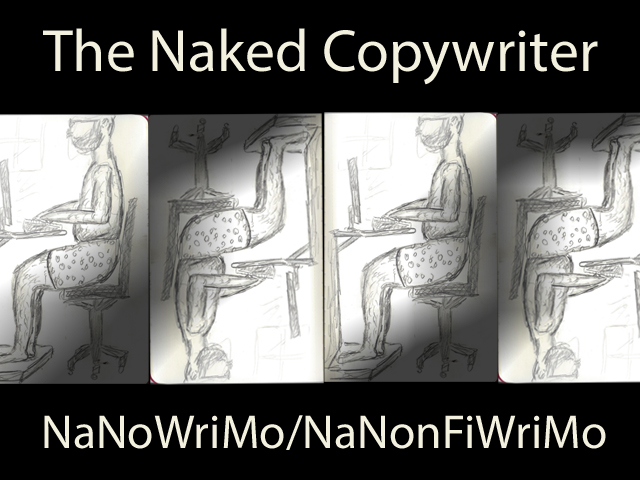Archive for the ‘Writing to build community’ Category
Writing Through and To
Rinse and Repeat.

Today’s Writing Task
###
Dumb sketch: Kirk Livingston
How to Go Out of Your Mind
Hint: It’s a crazy idea that just might work
Can you ever see from someone else’s point of view?
“No,” some say. We are entirely bound by our own way of seeing. All the world lays before us—all the friends and enemies and acquaintances and mobs, the institutions, the physical world, all the influences, everything that is, was and ever will be (amen)—all of which we perceive from our own vantage point. We fill our brain pan using our eyes, our ears, our sense of touch, our taste buds, our sense of smell.
It’s always me looking out at you.

There are manufactured instances, though. Huge numbers have already bought Star Wars: The Force Awakens tickets for the very experience of looking out at a favorite world through JJ Abram’s eyes, who happens to be channeling George Lucas’ story-brain. We reread Harry Potter or Tom Sawyer for the joy of seeing from someone else’s perspective.
Stories get us close to seeing from someone else’s eyes.
A primary challenge in teaching copywriting to English students is asking them to see from someone else’s perspective. It’s an invitation to awaken the force (as it were) of caring about someone else’s issues and feeling the weight they feel. And though we see and feel imperfectly, it is enough to begin to engage our imagination. And it is precisely the imagination-engaged that produces satisfying, potentially useful copy that has a chance of meeting some human need.
I want to think that as we age, we become better able to see from someone else’s perspective. But my experience says otherwise: it is all too easy to let my world close in to include only what impacts me directly.
Hard work, it is, to begin to see from someone else’s perspective.
And good work.
###
Dumb Sketch: Kirk Livingston
The Naked Copywriter (NaNoWriMo)
I’ll be absent for a month or so.
November is National Novel Writing Month. Last year I wrote the 50,000 word Fresh Water Fetish. This year’s 50,000 words are dedicated to story and explication around what it means to live a creative life. This may be a novel. It may be creative non-fiction. But in 30 days and 50,000 words I’ll have a better idea.
If, in my absence, you wonder what “conversation is an engine” might say about any particular topic, just type your term in the search bar. There are more than 1130 posts here–feel free to browse.
Alternatively: write your own novel for NaNoWriMo!
###
Wait: Can we talk too much?
Feed your existential intelligence
I’m gearing up to teach again: freelance copywriting and social media marketing. My understanding of communication and writing and the volunteer social-media tethering we do continues to evolve. I can talk and teach and speculate about what works for communication and how to provide what a client needs. I can talk about how we need to help our clients think—that is a piece of the value-add a smart copywriter brings to a relationship. But these days I’m seeing more limits and caveats—especially in the promises inherent in social media.
These are English students and communications and journalism. Some business students. Juniors and seniors. Many are excellent writers. Many, if not most, have worked hard to develop an existential intelligence, as Howard Gardner puts it. I teach at a Christian college, and from very many discussions with students, I know they will seek a place for faith in their life and work and life-work balance. Many if not all are just as eager to make meaning as they are to find a job.
That pleases me.
That’s one of the reasons I like to teach there.
One thing I’ve learned is that work alone does not satisfy the meaning-making part of life. Nor does work itself feed the existential intelligence. Craft comes close. Especially when we grow in our craft as we seek to serve others. But work and craft and meaning-making must be purposefully-pursued.
Intentional-like.
Because if we don’t pursue them, we fall prey to entertainment. We gradually anesthetize ourselves and starve the existential intelligence with the well-deserved zone-out time in front of the big screen TV. I’m starting to wonder if some of our social media habits also starve our existential intelligence.
I wonder because I wrestle with these impulses.
No. One does not fall into meaning-making. It takes work to make meaning.
I suppose that is the work of a lifetime.
###
Dumb sketch: Kirk Livingston
English: I still believe in you.
Get in that job-machine, mister.
More dire news for university English departments: from the University of Maryland, English majors are bailing like mad. And faster and faster.
The humanities have been getting a bad rap for, oh, half a dozen decades or so, because they don’t lead directly to a slot in a job machine. And, as the thinking goes, without the job machine you fail at life. Or at least paying for life’s good things (like a huge TV and plenty of Lean Cuisine) (Or rent and clothing).
We’ve certainly seen this coming. We’ve wondered: Why go into college debt just to be a philosophy-talking barista? We’ve lamented the pitiful conditions of adjuncts. Colleges in my area cut budgets and then cut more, from fat to bone. And now wholesale amputation to accommodate the demands of producing souls for job machines.
True: English departments that focus solely on esoterics need to undergo change. I’ll argue that any academic program (or any institution, frankly) that promotes the inward-gaze as the end-all, top-function of the human condition is currently being rudely awakened.
Smart English departments are tuning in to this—just like businesses have been realizing people don’t really care about their product all that much. Even churches are starting to realize there is a world of people living and working just outside their doors—people not interested in joining the club but crazy-interested in the meaning of life. Speaking of churches, we used to call it “evangelism” when we invited others in. Business evangelists understand all too well the benefit of going where people are and adapting their product to current conditions.
But reaching out to the rest of humanity—that’s where the action is.
It’s because we’ll always need to reach out, to communicate something to someone else, that I’m optimistic about English, if not exactly English departments. Rather than an either-or approach (deep-thinking/creative expression or assembly line training), we need both-and: deep-thinking and creative expression that leads to more conscious assembly line work. And perhaps that thinking will help us move beyond assembly lines entirely.
As I prepare my next set of writing classes for college English majors, I am beefing up the entrepreneurial end. Because the way out of a soulless slot in a job machine is to invent your own job machine.
That’s something we should train writers to do. And some of those writers will be English majors.
###
Image credit: Kirk Livingston
Writers at Work: “How do you imagine that will unfold?”
Seeing Need and the Power of Imagination
The leader’s peculiar gift is to help followers imagine how their work makes meaning. The leader makes personal how the organization’s work helps others, solves a human problem, makes the world better/more beautiful/safer, for starters. From that position of ownership (note that leaders may appear anywhere in an organization, position does not equal leadership) the leader imagines the next steps needed to move the organization forward. The leader acts on that vision and invites others in.
If you accept that the writer’s art is at least partly a reimagining or reordering of life, then you may be willing to consider the work of writing in business. Can writers in business look forward to how next steps unfold and then follow that thread backward to make those steps happen?
I say, “Yes.”
But not just because I do this for a living. [Full disclosure: I do this for a living]
It’s because writers in training are blind to this side of the life/work/art equation.
That’s a premise I’m toying with as I consider how entrepreneurship and professional writing fit together. I’m working through an entrepreneurial focus to the next Freelance Copywriting class at the University of Northwestern—Saint Paul, and I want to help English students see beyond self-focused essays and creative writing. A necessary starting point is inviting them to use their writerly tools to imagine life from that leadership/ownership/need perspective. I believe this can shift ownership to the writer and provide useful insight for right now.
Julian Sanchez’s tweet as the Senate report on CIA torture was released gets at this very concept:
Imagine forward and trace backward to locate solid actions. That is the leader’s gift—and possibly the writer’s.
###
Image credit: Kirk Livingston








